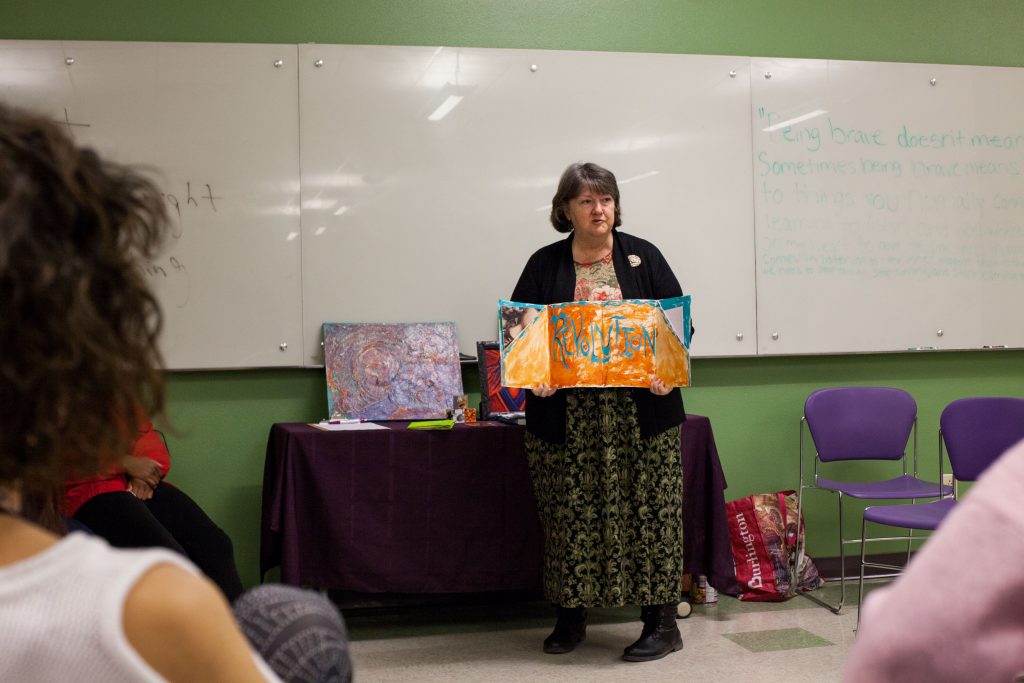
Each minute, nearly 20 people are physically abused by an intimate partner in the United States, according to the National Coalition Against Domestic Violence.
In recognition of Domestic Violence Awareness Month, Binghamton University’s Interpersonal Violence Program hosted an event, Planting the Seed of Resilience, on Friday, Oct. 20 in University Union. The event focused on art therapy as a way for victims and survivors of domestic violence to heal and cope with trauma.
The event also explored relationships, and how to set boundaries and create new narratives in regard to domestic violence. Students and faculty worked through guided meditations, expressive art journaling and open discussions.
Doris Cheung, a case manager and advocate in the Dean of Students Office, spoke at the beginning of the event to highlight the importance of engaging in creative discussions, especially for victims and survivors during the healing process.
“A lot of times, people may not be ready to go to the [University] Counseling Center, but [with] this kind of event, they are more willing to attend because this is something that is really helpful for them,” Cheung said. “Other Domestic Violence Awareness Month events have been more about awareness but my event is more about healing.”
Planting the Seed of Resilience also aimed to educate students and staff about the services available on and off campus to victims and survivors of domestic violence, including the High Hopes Helpline, the Crime Victims Assistance Center, the University ombudsman and the University Counseling Center. Some attendees, including Tierra Desir, an undeclared sophomore, used the event as an opportunity to learn about these resources.
“I haven’t really felt comfortable going to the services because I don’t know how much they would help,” Desir said. “But we’ve learned about the importance of communication, and while I haven’t been to the counseling services yet, I would be more open-minded toward it now.”
Representatives from both A New Hope Center in Owego, New York, and the Crime Victims Assistance Center, a local organization, tabled at the event. Both groups are advocates for victims and survivors of sexual and domestic violence and provide services to assist people in their recovery process and beyond.
Cindy Casterlin, a recovery coach from the Mental Health Association of the Southern Tier and an artist, led attendees through steps of the recovery process and discussed the importance of art therapy and creativity. She shared her own art and provided materials for attendees.
“Art is a very empowering process because we are choosing what we’re going to work with, to the degree that we will work with it that day, who we’re going to share it with,” Casterlin said.
Attendees were encouraged to share their opinions and experiences with domestic violence as they worked through the different forms of art therapy. Jan Marvin Ligan, a sophomore majoring in integrative neuroscience, said he had a personal connection to domestic violence and said he felt events such as this one made an important impact.
“For me, growing up, I’ve experienced domestic violence but I couldn’t really say much about it and I didn’t know how to cope with it because of that struggle with feeling inferior,” Ligan said.
Casterlin said that of all of the workshops she has run, the art therapy tends to be more popular because it makes people feel empowered.
“What I teach is a process so that you can dive inside and find what you need to find to create the life you were meant to lead,” Casterlin said. “The world needs each and every one of us just as we were meant to be and art is one way you get there.”


